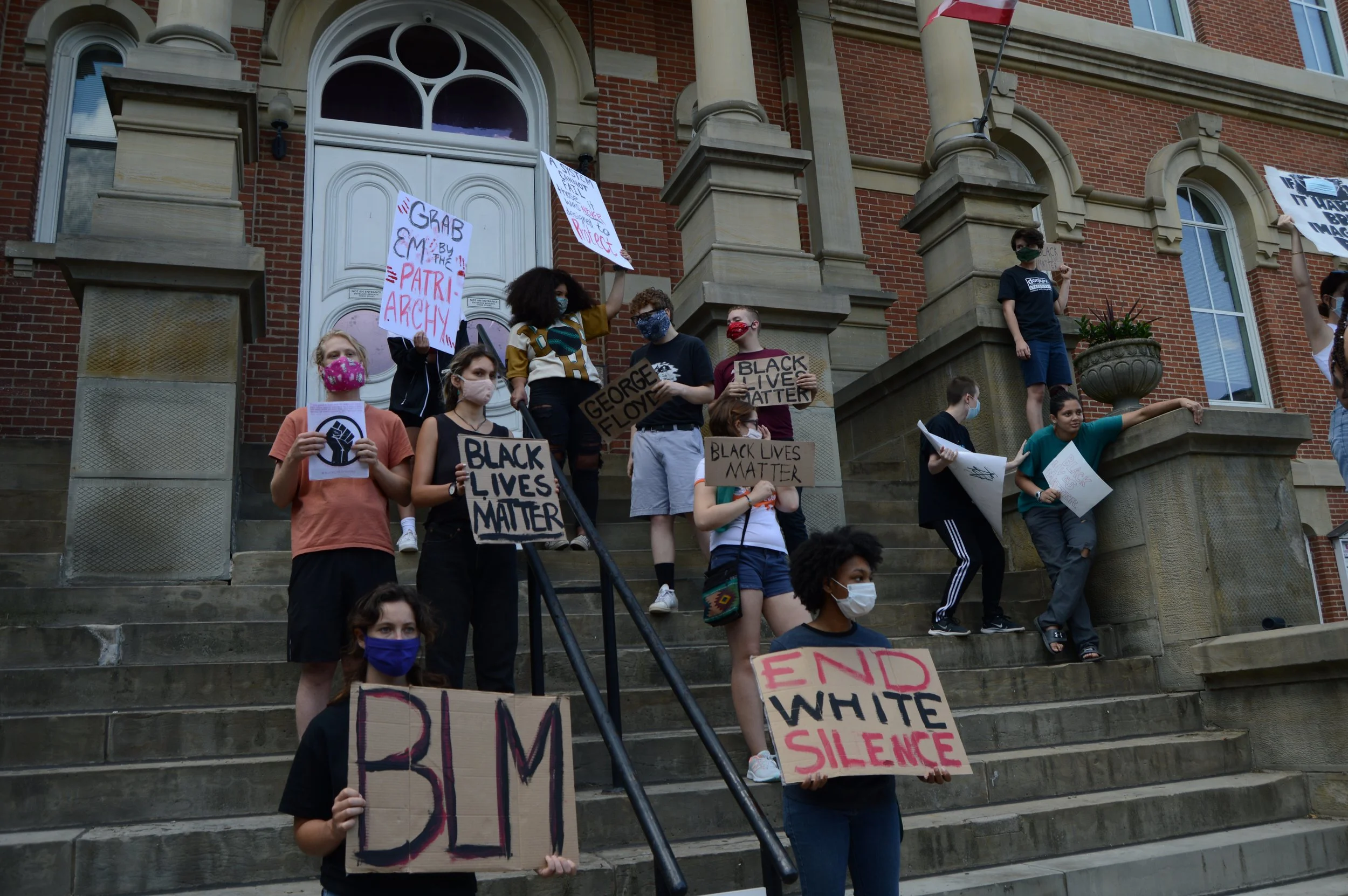OPINION: Political burnout is hurting our generation
“Protest for the killing of George Floyd on the steps of the Athens County court house on May 30, 2020.” Photo courtesy of The New Political.
Julianna Rittenberg is a freshman studying political science and an opinion writer for The New Political.
Please note that these views and opinions do not reflect those of The New Political.
Political burnout, or politics fatigue syndrome, has been an issue in America for years.
In 2011, former President Barack Obama remarked that people are tired of politics. In 2014, 15 of the 25 states that held primaries reported record low turnout. This flipped during the 2020 election, when there was record high voter turnout because people were outraged by Donald Trump’s presidency and therefore paying attention. Those in the field of politics are anxiously awaiting to see if 2022 will have a drop in turnout.
In 2018, a Pew Research Center study found that 68% of Americans felt worn out by the amount of news content there was and much fewer, 30%, felt that they liked the amount of news they received. When the study was reconducted in 2019, these numbers stayed roughly the same; 32% liked the amount of news while 66% felt burnt out.
Broken down by political parties, Republicans tended to feel more burnt out at 75%, and 59% of Democrats felt burnt out. Across all parties, burnout was more common in those who pay less attention to the news.
Conservative political strategist and lobbyist Diana Banister sees four main causes of political burnout: widespread uneasiness with the government, media becoming more sensationalized and polarized, frustration with the political process, and disillusionment with politicians.
Activists in particular feel a certain brand of political burnout. Activism work can be agonizing because so much of it is being told “no” or “not now,” working long hours and dealing with defeat after defeat. Activists are attempting to dismantle systems, and with that comes exhaustion, stress and many disappointments. As a result, roughly 50% of activists end up leaving their professions entirely.
This is a problem. We need people to continue fighting for reforms, dismantlement and change.
College students also deal with political burnout in a unique way. For a generation marked with rising mental health issues and the COVID-19 pandemic, changing media styles, and all of the other political issues on top of that stress, is a lot to manage and work through.
In 2020, a study found that 75% of college students were stressed out by the election. Factors such as race, gender, class and sexual orientation also played into this. Those in minority and marginalized groups also felt more stressed out by politics because the stakes were higher. Minorities and other marginalized groups are more affected by the decisions politicians make about their lives, as they tend to target groups that are less able to defend themselves in the court system.
For example, there are currently dozens of bills targeting transgender people across the country. Transgender people are a minority group in this country and have a harder time finding and affording a lawyer to represent them. Additionally, there is much debate over whether or not the constitution applies to their rights.
There are systemic factors built against minorities in the political process. Black people and people of color have been barred from voting for as long as this country has existed.
Minorities’ way of life can be determined by those voted into office, people who do not believe they deserve the same rights and deny their existence. Of course this leads to higher stress and more frustration and disillusionment with our political system.
With the COVID-19 pandemic, society has seen a positive shift towards prioritizing self-care. If self-care can invade our workplaces and continue to be prioritized by employers, then self-care and mental health may help combat political burnout.
Colleges should be doing more to help college students who are experiencing political burnout. Classes could be canceled on Election Day to make it easier for students to participate in the political process.
Inside the classroom, particularly in politically aligned courses, professors should discuss political burnout and offer strategies to combat it. They can play an active role in prioritizing positive mental health practices.
There is a lot of guilt that comes with experiencing political burnout. People feel the need to always pay attention, especially with the rise of social media activism. There is always something to be outraged about, fighting against and fighting for. Many of my friends and I feel guilty for taking social media breaks because we know how much is at risk.
However, not everything is on the shoulders of each individual. Taking periodic breaks from social media and the news can be healthy. Rest will allow yourself to reset; you will not make the change you are looking for if you are exhausted and burnt out.
Activism is important. Paying attention to politics is important. Taking care of your mental health is important. These pieces fit together, and as a society, as well as college students, we need to do a better job at finding the balance — our future depends on it.

